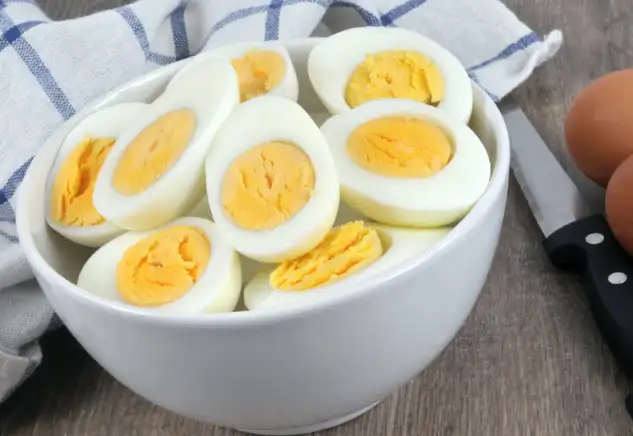Have you ever been confused by the term “hard-cooked egg” and wondered why it’s different from “hard-boiled egg”? You’re not alone, and the difference might surprise you. The problem is that many people think “boiling” is the best way to prepare eggs, but this can lead to overcooked, rubbery results. That’s where “hard-cooked” eggs come in—a gentler cooking method for perfect results every time. Let’s explore what makes this technique superior and how you can master it at home.
Why “Hard-Cooked” and Not “Hard-Boiled”
The term “hard-boiled egg” suggests that the egg is boiled vigorously for the entire cooking process. However, according to Mildred Ying, a former food editor at Good Housekeeping Magazine, boiling an egg can lead to overcooking and a rubbery texture. Instead, the preferred method involves cooking eggs gently in hot water, which ensures a tender egg white and a perfectly cooked yolk. Thus, the term “hard-cooked” is more accurate and reflects the ideal cooking method.
How to Cook the Perfect Hard-Cooked Egg
The secret to a perfect hard-cooked egg lies in a simple, gentle process. Here’s a step-by-step guide:
- Prepare the Eggs: Place your eggs in a single layer at the bottom of a pot.
- Add Water: Cover the eggs with cold water, ensuring about an inch of water above the eggs.
- Heat the Water: Bring the water to a gentle boil over medium heat.
- Remove from Heat: As soon as the water reaches a boil, remove the pot from the heat.
- Cover and Rest: Cover the pot with a lid and let the eggs sit for 12 minutes.
- Cool the Eggs: Transfer the eggs to a bowl of ice water to halt the cooking process. Let them cool for at least 5 minutes.
Following this method prevents the greenish-gray ring that sometimes forms around the yolk, which is caused by overcooking.
The Science Behind Hard-Cooked Eggs
When you cook an egg, heat causes the proteins in the egg white and yolk to denature and coagulate, turning them solid. The egg white starts to set at 145°F (63°C), while the yolk thickens at 150°F (66°C) and solidifies at 160°F (71°C). Cooking gently ensures even heat distribution, avoiding overcooked whites or undercooked yolks.
Hard-Cooked vs. Soft-Boiled Eggs
While hard-cooked eggs have fully set whites and yolks, soft-boiled eggs are cooked for a shorter time, leaving the yolk runny and the whites only partially set. Both are popular breakfast options, but hard-cooked eggs are more versatile for use in recipes.
Uses for Hard-Cooked Eggs
Hard-cooked eggs are incredibly versatile and serve as the foundation for many dishes, including:
- Egg Salad: Mix chopped hard-cooked eggs with mayonnaise, mustard, and seasonings for a classic sandwich filling.
- Deviled Eggs: Scoop out the yolks, mix them with spices and condiments, and pipe them back into the whites.
- Cobb Salad: Slice hard-cooked eggs for a protein-packed addition to salads.
- Snacks: Enjoy them plain with a sprinkle of salt and pepper for a quick, nutritious snack.
Brown Eggs vs. White Eggs
Is there a difference between brown and white eggs? Not really. Brown eggs come from hens with red feathers and red earlobes, while white eggs come from hens with white feathers and white earlobes. The color of the shell doesn’t affect the taste or nutritional value.
Tips for Choosing and Storing Eggs
- Farm-Fresh Eggs: If you’re traveling or live near farms, take advantage of locally sourced eggs. They’re often fresher and tastier.
- Storage: Refrigerate hard-cooked eggs in their shells to keep them fresh for up to a week. Peeled eggs should be consumed within two days.
Hard-cooked eggs are a simple yet versatile food that’s perfect for any meal. By using the gentle cooking method described above, you can achieve a tender white and a perfectly cooked yolk every time. Whether you’re making egg salad, deviled eggs, or just enjoying them as a snack, mastering the art of hard-cooked eggs is a skill every home cook should have.
Now that you’re egg-ucated, go ahead and try it out for yourself! You might never go back to “hard-boiled” again.

